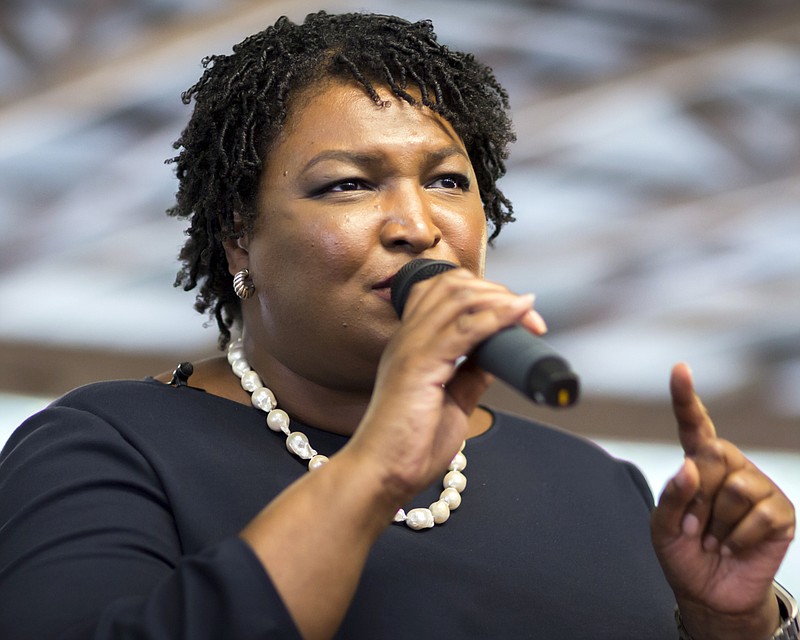ATLANTA (AP) - Stacey Abrams steps into the brightest spotlight of her political career Tuesday night with a speech intended to draw a clear contrast between Democrats and President Donald Trump.
Abrams narrowly lost her bid in Georgia last year to become America's first black female governor. Instead, she'll become the first black woman to deliver a State of the Union response.
It's one of the toughest jobs in politics - a role that has tripped up members of both parties in the past. She must introduce herself to a national audience who may not be familiar with her groundbreaking political resume as the daughter of Mississippi-born parents who went on to Yale Law School and became the first black woman to lead her party in the legislature before her bid for governor.
More fundamentally, Abrams must represent her entire party with an appeal aimed at a base desperate to reclaim the White House and at a wider swath of less-partisan Americans who are uneasy with the Trump administration.
It all comes as she weighs national party overtures to fire up her campaign office again and run for the Senate in 2020.
Senate Minority Leader Chuck Schumer, who asked Abrams to deliver the Democrats' response, said earlier Tuesday that she "is going to do a great job" and billed Trump as the warm-up act for her.
Trump derided Abrams as "unqualified" for statewide office during her gubernatorial campaign.
Those close to Abrams say she will deliver an argument for a more unified society with shared prosperity. She will focus on education, health care and civil rights - including voting rights - with a focus on the middle class.
The White House has previewed a similar theme of unity for the president's address, but Abrams' advisers say she wants to lay out a more inclusive vision that spans racial, geographic and cultural divides.
The distinctions from the president's policies and rhetoric, they say, will be obvious.
"Stacey will speak from both her heart and life experience about the grace of community that lifts us and heals in times of need," said Karen Finney, a Democratic strategist close to Abrams.
Finney said Abrams wants to speak to and about "people who too often are never heard from," while offering a path for "bringing people together from all backgrounds to create genuine pathways to prosperity."
Abrams will deliver her speech in an undisclosed metro-Atlanta location with an audience that includes workers, activists, labor leaders, health care professionals, educators, entrepreneurs and voters who her aides say had trouble casting their ballots in 2018. Abrams abandoned her governor's race without a formal concession, asserting that now-Gov. Brian Kemp used his last post as secretary of state to make it harder for people, particularly minorities and the poor, to cast ballots. Kemp defended his job performance, but Abrams has still emerged as a leading voting rights advocate nationally.
Abrams is expected to lean heavily on her biography in outlining Democrats' priorities.
Running for governor, Abrams talked often of her parents and the challenges they faced as children of the segregated Jim Crow South. She also spoke unabashedly about her personal debts, which Republicans used as an attack. Abrams often said her student loans and other debts amassed caring for family members left her more empathetic than most politicians to what the majority of U.S. households experience in day-to-day life.
Abrams' address comes as she considers whether to challenge Republican Sen. David Perdue, a prospect that Schumer wants and that national party leaders say could benefit Democrats' presidential ticket as well. Abrams got 85,000 more votes in November than Democrat Hillary Clinton got against Trump in 2016.
In choosing Abrams, Schumer also gives a nod to the importance that black women have long played in anchoring the Democratic base, including in many battleground states.
Abrams won't be the only Democrat weighing in Tuesday night. California Attorney General Xavier Becerra, a staunch Trump critic, will deliver the party's Spanish-language response.
And independent Sen. Bernie Sanders of Vermont will deliver his own response broadcast on his social media platforms once Abrams has concluded.
The past and potentially future presidential candidate has done the same thing previously, but he's been criticized this year for trying to upstage or take attention away from Abrams and her historic speech. Sanders struggled with black voters in his 2016 primary fight against Clinton.
The Working Families Party has tapped Wisconsin Lt. Gov. Mandela Barnes, who, like Abrams, is black, to speak after Abrams.
Schumer said Tuesday that he has no problem with the added voices. Once Abrams and Becerra are finished, he said, "then every other member is free to do whatever they want."
